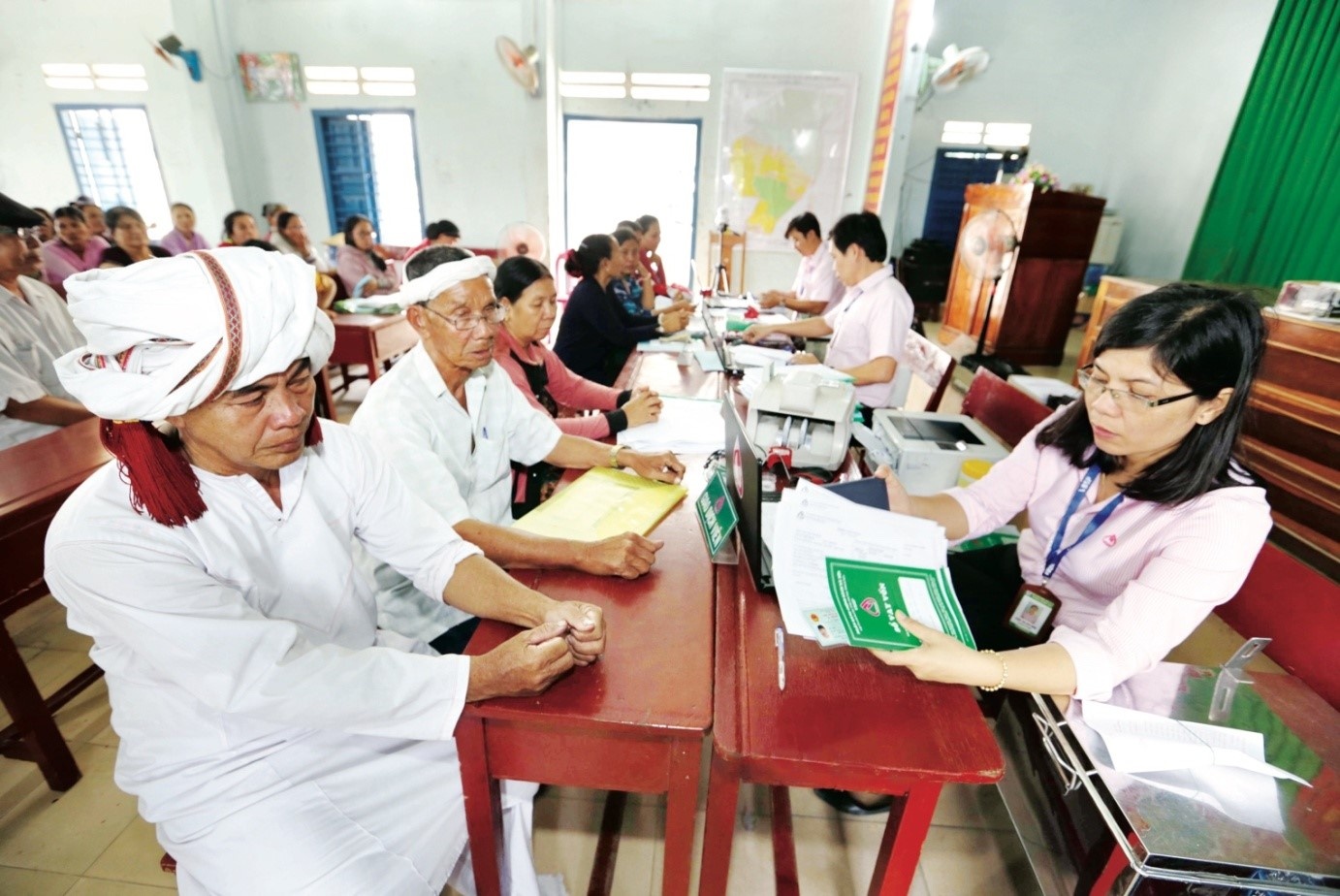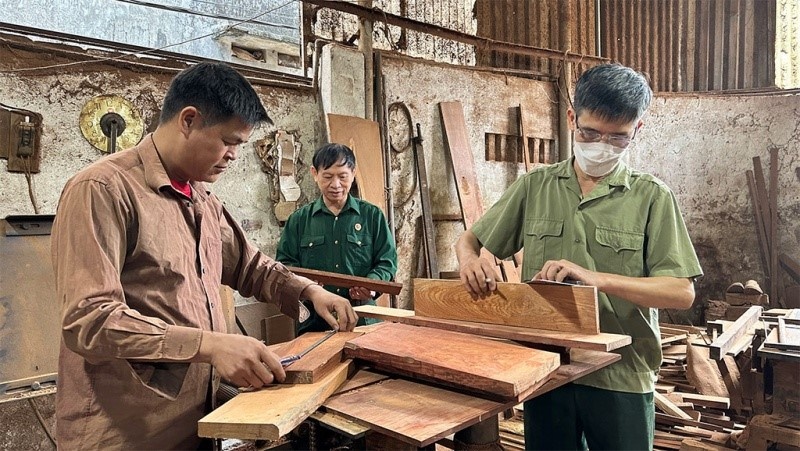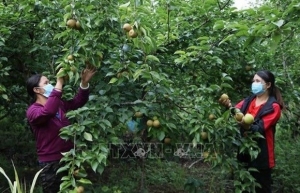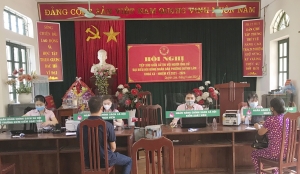VBSP: 20 years on the journey of poverty reduction
Only 60km from Hoai Nhon town, 61 out of the 84 households in village One, An Toan commune were poor. Although there were many policies to support local economic development and VBSP did not limit capital sources for localities or loan sizes for households, lending was not easy.
Dinh Van Ken, head of the Savings and Credit Group (SCG) in village One, a Ba Na ethnic minority said that the government, the commune, and himself had encouraged poor households many times to borrow capital but only 49 members agreed because they were afraid of the risks and did not dare to borrow. Some people did not even have the belief to rise up but instead relied on the government and charities.
 |
| VBSP currently has 10,435 transaction points in communes, wards, and towns nationwide |
The journey out of poverty was a long and tough one. At the age of 35, Ken still lived with his wife and three children in poverty.
Seeing his children grow up every day in extreme poverty, he was determined to borrow VND20 million (now $870) from the Poor Household Programme in 2009 to buy a cow. However, the cold climate caused the cow to die.
He did not give up and accumulated money to pay off the bank loan. He then continued to borrow a further $2,170 from the programme to raise a buffalo and some pigs.
By 2020, Ken had paid off his debt and stepped off the list of poor households. From his accumulated breeding experience, he continued to borrow $4,130 from the Programme for the Post Poor and then $3,910 from the Job Creation Programme to expand his herd of buffalo and black pigs following the One Commune, One Product initiative of An Lao district.
Currently, he has a herd of 25 buffaloes along with the income from taking care of 50 hectares of protected forest and extracting honey.
He has also built a solid wooden house and bought a refrigerator and television for his family. Recently, he has just renovated and expanded his house to participate in the exploitation of local community tourism. His story and production experiences were shared among the SCG.
| Creating commune transaction points with fixed monthly transaction dates is a unique breakthrough initiative from VBSP. It is a step forward in reforming administrative procedures to bring credit capital to people in a timely manner, contributing to the implementation of the Comprehensive Financial Strategy for people in rural and mountainous areas. |
The story in An Toan commune highlights the difficulties VBSP faced in the early days of its establishment.
In early 2002, poor households accounted for nearly 30 per cent of all households nationwide. Service areas were mostly within difficult terrain and suffered from underdeveloped infrastructure.
In many mountainous provinces and the Mekong Delta, the percentage of communes that did not have a car road to the People's Committee headquarters ranged from 30-80 per cent.
In addition, the different cultures of the 54 ethnic groups and outdated self-sufficient production practices rooted in thousands of generations made the task of bringing government capital to the villages even more difficult.
VBSP's credit officers became key pioneers with local authorities to support people to do business and reduce poverty.
Although the story of carrying capital to highland villages by foot or to people in flooded areas by boat now belongs in the past, it is a part of the history associated with the long journey of policy credit implementation.
From the first days of its operation, VBSP has built, maintained, and regularly consolidated the specific credit management method, with the implementation of direct lending and entrusting some tasks in the lending process to other organisations, including the Vietnam Women's Union, the Vietnam Farmers' Union, the Vietnam Veterans Association, and the Youth Union.
The entrustment method has brought into play the advantages of organisations with a network of tens of thousands of officers in all communes, hamlets, and villages. Benefits can be drawn from their rich experience in social work to propagate policies and change people's awareness, allowing the integration of policy credit programmes with economic development programmes to guide production methods and support training in production and business techniques.
The poor and other policy beneficiaries have gradually changed their thinking and ways of doing things, actively borrowing capital to invest in production, create jobs, and improve lives. The step-by-step approach to commodity production and credit relationships has eliminated the idea of relying on state grants.
Creating commune transaction points with fixed monthly transaction dates is a unique breakthrough initiative from VBSP. It is a step forward in reforming administrative procedures to bring credit capital to people in a timely manner, contributing to the implementation of the Comprehensive Financial Strategy for people in rural and mountainous areas.
Crafting policies to support sustainable development
The rapid and strong development of the country's economy after Vietnam opened for international economic integration in 2007 also poses new problems in the design and implementation of social credit policies. They aim to harmoniously combine economic growth and social justice with the goal of multidimensional, inclusive, and sustainable poverty reduction and the implementation of new rural construction criteria to boost the country’s socioeconomic development.
In that context, VBSP not only promotes its role as an extended arm of the government to implement preferential credit policies, but it also bridges the gap between the poor and disadvantaged groups with state and government agencies to expand the number of policy beneficiaries and raise loan sizes to meet the urgent needs of the people.
 |
| Policy capital helps many veteran households in Dong Anh district to develop traditional handicrafts |
From the initial three credit programmes, VBSP has now had more than 20 credit programmes designed into a synchronous policy system with multi-dimensional support, helping to solve basic problems in the lives of the poor and other policy beneficiaries. This contributes to narrowing the gap between regions and successfully contributes to the National Target Programme on sustainable poverty reduction, new rural construction, and social security assurance.
Vietnam has become one of the first countries to fulfil the United Nations' Millennium Development Goals, a bright spot in poverty reduction around the world.
In 2014, the Secretariat of the Party Central Committee issued Directive No.40 CT/TW on strengthening the Party's leadership of social policy credit.
This was an important milestone in the implementation of social policy credit over the past 20 years and helped create changes in policy credit work with the strong participation of Party committees and local authorities. By November 30, the entrusted capital from localities at all levels reached $1.26 billion, an increase of 7.6 times compared to before the directive.
Over the past 20 years, policy credit has supported nearly 6.3 million households to cross the poverty line, created jobs for more than 5.9 million workers, supported more than 3.8 million disadvantaged students, helped buy more than 84,000 computers and online learning tools for students, built more than 16.8 million rural clean water and sanitation projects, and more.
Social policy credit has made a significant contribution to reducing the poverty rate nationwide. Over the 2011-2015 period, the poverty rate shed from 14.2 per cent to 4.25 per cent and in 2021 it dropped further to 2.23 per cent.
These results helped the whole country to support 5,813 out of 8,227 communes, equal to 70.7 per cent, to meet the new rural commune standards, of which 803 communes meet the new advanced rural standards and 94 communes meet the model new rural standards.
 | Gov’t approves 2021-2025 national target programme on sustainable poverty reduction Permanent Deputy Prime Minister Pham Binh Minh has recently signed a decision approving the national target programme on sustainable poverty reduction for the 2021-2025 period with total funding of at least 75 trillion VND (3.3 billion USD). |
 | Policy credit: the fulcrum to support the poor Along with the government’s many policies and measures to realise the national target programmes on sustainable poverty reduction and building new-style rural areas, the Vietnam Bank for Social Policies has been carrying out multiple policy credit programmes assigned by the government with efficient support for needy people and diverse policy beneficiaries. |
What the stars mean:
★ Poor ★ ★ Promising ★★★ Good ★★★★ Very good ★★★★★ Exceptional
 Tag:
Tag:
Related Contents
Latest News
More News
- Banking sector targets double-digit growth (February 23, 2026 | 09:00)
- Private capital funds as cornerstone of IFC plans (February 20, 2026 | 14:38)
- Priorities for building credibility and momentum within Vietnamese IFCs (February 20, 2026 | 14:29)
- How Hong Kong can bridge critical financial centre gaps (February 20, 2026 | 14:22)
- All global experiences useful for Vietnam’s international financial hub (February 20, 2026 | 14:16)
- Raised ties reaffirm strategic trust (February 20, 2026 | 14:06)
- Sustained growth can translate into income gains (February 19, 2026 | 18:55)
- The vision to maintain a stable monetary policy (February 19, 2026 | 08:50)
- Banking sector faces data governance hurdles in AI transition (February 19, 2026 | 08:00)
- AI leading to shift in banking roles (February 18, 2026 | 19:54)



























 Mobile Version
Mobile Version